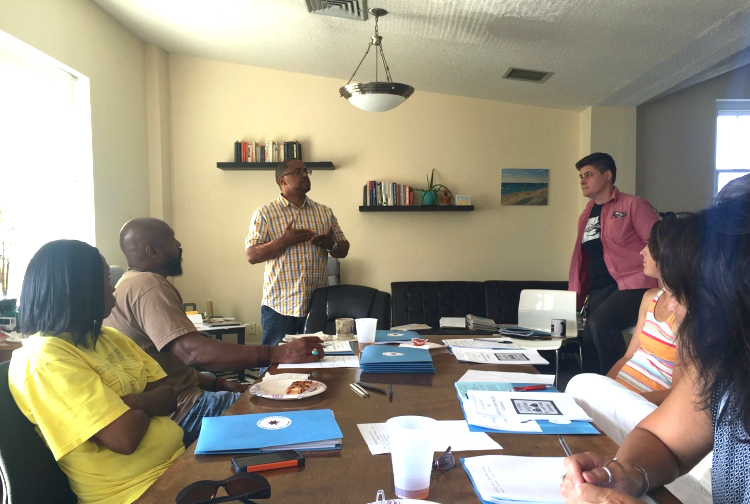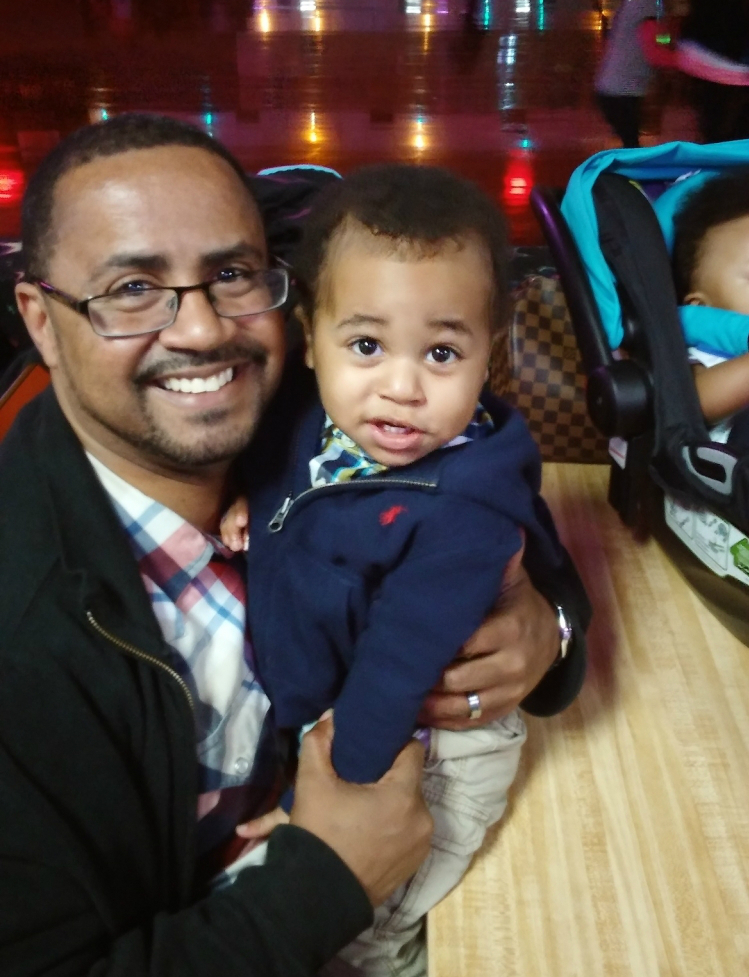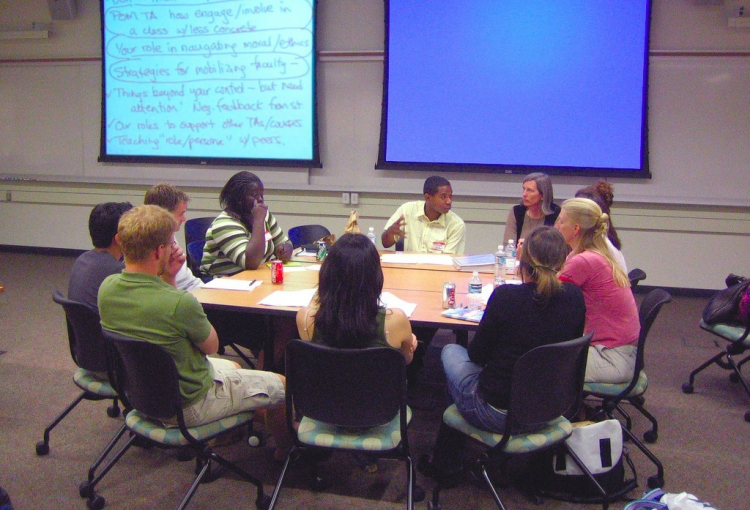
Demetrius Titus (standing, center) facilitates a Good Neighbor Project training. Michigan / AFSC
An interview with the director of the Good Neighbor Project of the AFSC Michigan Criminal Justice Program.
Can you tell us about your work at AFSC?
 I’ve been working with the Good Neighbor Project, started by our director, Natalie and my predecessor, Ron Simpson-Bey. It’s based on restorative justice practices. It’s a co-mentor program. We connect those people who are currently incarcerated doing life or long sentences with people who are outside participants. It’s beyond just a pen-pal program. We give prompting questions to both participants. It creates a dialogue by which each person is able to open up.
I’ve been working with the Good Neighbor Project, started by our director, Natalie and my predecessor, Ron Simpson-Bey. It’s based on restorative justice practices. It’s a co-mentor program. We connect those people who are currently incarcerated doing life or long sentences with people who are outside participants. It’s beyond just a pen-pal program. We give prompting questions to both participants. It creates a dialogue by which each person is able to open up.
We know that in prison, there’s an unwritten rule that you never talk about it or work through your situation because it puts you a position of vulnerability. This project allows people on the inside to open up and work through their situation. We know that only way healing can take place is by dealing with it. This project allows people in prison to deal with their issues, the reasons for their incarceration, the trauma from their incarceration. As well it educates the outside co-mentor on things going on in prison, what’s transpiring in the judicial system.
How many people are involved both inside and outside?
We have a little over 40 active co-mentor relationships. What I mean by active is they are staying in contact with each other and are within the project's guidelines. They’re writing each other at least twice a month, which is one of the criteria. We also do follow-ups with our inside and outside participants to make sure we know if there’s any trouble shooting that needs to be done, any technical support needed.
Currently I have 30 people on inside who are waiting to be linked up with an outside co-mentor. We’re in the recruiting process; we speak at different affairs, different functions, a lot of church functions. We have the opportunity to bring people in, quality people. We’re not so focused on quantity. We want people who, when they sign up, will truly commit to the project because there’s so much needed to make it work.
Is this project just for people in Michigan?
We’re just dealing with people in prison in Michigan. However, we do have outside mentors who are from all over the nation. I have people who write from Boston, one who writes from Texas. So we extend the program out nationwide and worldwide. We only deal with Michigan prisoners because that’s who we have direct access to.

How do you see the project growing?
I would like to see as many connections as possible. The project is based on restorative justice, the healing of the offender, the victim and the community as whole. Sooner or later, the way we look at it, these individuals will be released. We want to create these mentorships in order to create contact with the outside. Through that contact, they can be better prepared.
The thinking behind prison walls is completely different from what it is out here. What this project does with our questionnaires is help them learn how to re-think. Someone in prison for 30-40 years in a controlled and intense environment, their thinking shifts.
What we’ve been doing is creating a continuing training. We’re offering conference calls with outside participants. We’re having roundtable discussions. We’re having guests come and talk about things like cognitive thinking, substance abuse, relapse prevention.
Right now we’re working with people called JLWOPERs (juvenile lifers with-out parole). A recent U.S. Supreme Court decision changed the scope of these sentences. Michigan is working to resentence these young men and women under these laws. So they’re going to be coming home. We want to connect them with as many people as possible so they come home with a realistic perspective of what’s going on out here. Building that friendship and co-mentorship with the person who is out here will, in turn, help them with their transition.
You’re a returning citizen yourself?
Yes. I spent 18 years incarcerated. I was in prison for drug possession. No priors. I was in school at the time, I made some wrong choices, went with the wrong people. I was sentenced, believe it or not, to three life terms for possession of a controlled substance. This was during the “war on drugs.” There were giving long and extended sentences for people caught with drugs.
During my time of incarceration, I was able to educate himself. I was able to learn about the law. I was incarcerated in December of 1990. Around 2007-2008, Gov. Granholm was governor of Michigan. The system was completely overcrowded, and she was looking for a way to offer relief. One of her ideas, for those who were incarcerated for a long period of time for drugs, she wanted to give them relief. What I did, when I got wind of this, I was working in the law library, I was able to draft my own commutation request. She established an executive clemency board. I was able to submit my commutation request and, after a about year, I was released in 2009 because my commutation was granted.
This is why I’m so passionate about this. Even for me who had a lot of support, it was still very difficult, the transition in my thinking, the obstacles I faced. No one wanted to give you a chance, no wanted to give you a job. Everywhere you went, as soon as you expressed or let them know you were incarcerated, it was doors shut. It was a very difficult transition. But I stayed with it. I had a very strong support system; along with my belief in God, that's what helped get me through that very difficult transition.
During this transition, I finally landed a job in working in a factory, I worked my way up and ended up in hospitality, in management. When this position became open to me, because of my passion for what I had gone through, I wanted to reach back in and help. This gives me the opportunity to fulfill the passion that was created in me from everything I’d gone through.